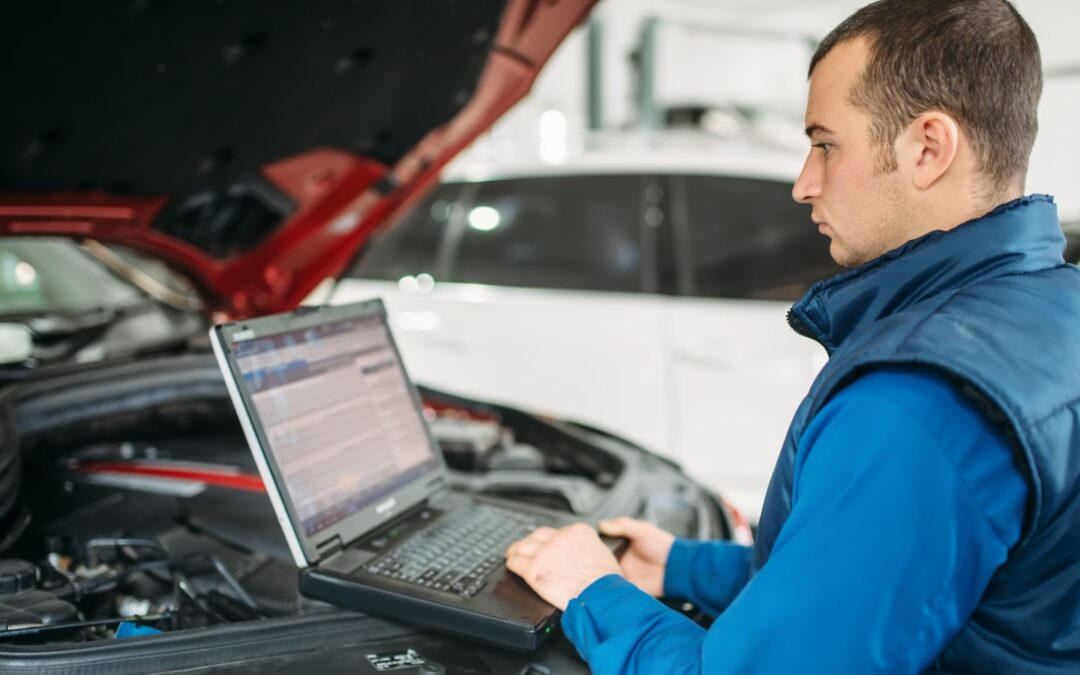Vehicle service and America’s love affair with the automobile stretches back over a century! Much like the telephone, printing press and radio — man hasn’t seen any good reason to leave the art of tinkering to professional hands. Quite the contrary, it’s been his prerogative to be knee-deep in the effort of maintaining and optimizing his vehicle. Today, as it becomes increasingly difficult for the amateur mechanic to be effective on routine repairs, the love for automotive life and culture remains larger than ever.
Types of Vehicle Service the Untrained Mechanic Can Perform
- Status reports: Check all around the vehicle inside and out, for signs of pressing wear issues or immediate damage to the automobile.
- Visual improvement / safety: Simply cleaning your vehicle (especially the windows and windshields) can have a profound effect on the safety of driving it. The driver’s ability to effectively see is key to avoiding collisions, as logic suggests.
- Maintenance scheduling: So, this does bend the lines of what we can call owner-directed car service but it is still an area where you, as the owner of a vehicle, can make a profound impact. The cost will inevitably be greater to avoid or delay necessary car service and repair, so proper appointment scheduling in advance can alleviate any potential damage that could have potentially resulted from neglect.
- Recall awareness: Most new cars, and some older ones, will be occasionally called back to the dealership for a recall. Often times, avoiding a recall bulletin is worse than avoiding an oil change. You aren’t required to take your recall notices to the dealerships, in most cases. Drivers can still bring these matters to their local mechanic’s attention and if it is something that requires specialized computers or tools, that determination can be made with you and your trusted mechanic.
- Wear item upgrades: Tires, brakes, and wiper blades are often times items that used to fall under the purview of the garage mechanic. Now, even a wiper blade can have a complicated installation schematic and might indeed require the touch of a professional. Regular wear and tear types of vehicle service also need to be completed by trained hands.
Why Professional Vehicle Service is Important
- Sensors and specialized equipment: Today’s vehicles require professional service due to the many computerized and sensor-driven components associated with a modern vehicle.
- Diagnosis with repair: While handling routine car service, your mechanic may notice something else amiss with your vehicle. An untrained person might not be aware enough to notice other issues while completing a routine task.
- Reduced long-term cost: A dollar spent today on car service work is three to five dollars saved down the road. Preventative maintenance is the cheapest way to protect the life of your car.
Despite the long-honored tradition of tinkering under the hood being baked into the national DNA, the safety and cost-effectiveness of twisting wrenches has started to hit the decline in popular American society. Fortunately, the prevalence of affordable, qualified and professional auto care professionals is on the increase. All Around Auto Care understands the importance of regular, quality car service procedures and aims to be the go-to solution for local area drivers. Taking car service tasks into one’s own hands is a long-honored tradition — and always an option — however, perhaps it is an option best left in the hands of real automotive care professionals.

FAQs About Vehicle Service
1. What types of vehicle service can an untrained mechanic perform?
Untrained mechanics can handle several basic vehicle service tasks, such as conducting status reports to check for signs of wear or damage. Cleaning your vehicle, especially the windows and windshields, can also significantly improve safety by enhancing visibility while driving. Acknowledging the importance of maintenance scheduling is another crucial area where owners can have a substantial impact, helping to prevent costly repairs down the line.
2. Why is it important to be aware of vehicle recalls?
Being informed about vehicle recalls is essential for safety. Recalls can involve critical repairs that, if ignored, might lead to dangerous situations. While many drivers assume recalls must be addressed at a dealership, local mechanics can often handle these issues, provided they have the necessary tools and knowledge. In fact, avoiding a recall can be riskier than skipping an oil change, as the consequences can lead to severe vehicle issues or accidents .
3. What are common wear items that require professional installation?
Common wear items like tires, brakes, and wiper blades often require professional installation due to their complexity. While some of these tasks were once within the scope of amateur mechanics, modern designs may necessitate specialized tools and knowledge to ensure proper installation and functionality. For instance, improper tire alignment can lead to uneven wear, affecting vehicle performance and safety .
4. Why is professional vehicle service crucial for modern cars?
Today’s vehicles are equipped with complex computerized systems and sensors, making professional service more critical than ever. Trained mechanics can accurately diagnose issues that an untrained person might overlook. Preventive maintenance performed by professionals not only saves money in the long run but also extends the vehicle’s lifespan by addressing issues before they become significant problems .
5. How does routine vehicle service save money over time?
Investing in routine vehicle service can save you three to five times that amount in potential future repairs. By catching problems early and performing regular maintenance, you protect the longevity of your vehicle. Preventive maintenance is the most cost-effective way to ensure your car runs smoothly and safely.
6. What should I look for in a professional auto care service?
When seeking a professional auto care service, consider factors such as certifications, customer reviews, and experience with your vehicle type. A reputable service provider should have a strong understanding of modern vehicle systems and a commitment to quality care. Establishing a relationship with a trusted mechanic can help you navigate vehicle maintenance more effectively .
7. How has the role of amateur mechanics changed in recent years?
e role of amateur mechanics has evolved significantly, with the increasing complexity of modern vehicles making it challenging for untrained individuals to perform even basic repairs. Despite this shift, the passion for automotive culture remains strong, and many still enjoy the tradition of tinkering. However, for safety and reliability, seeking professional assistance is often the better option.
8. Can regular cleaning impact my vehicle’s performance?
Yes! Regularly cleaning your vehicle, especially the windows and windshields, plays a vital role in maintaining safety. Clear visibility is crucial for avoiding accidents, and a clean vehicle can enhance your overall driving experience. Surprisingly, neglecting simple cleaning tasks can contribute to dangerous driving conditions .
9. How often should I schedule routine maintenance?
It’s advisable to follow your vehicle manufacturer’s recommended maintenance schedule, typically outlined in the owner’s manual. This often includes oil changes, tire rotations, and fluid checks at specific intervals. Staying proactive about scheduling these services can prevent larger issues from developing.
10. Why should I trust professionals over attempting repairs myself?
While DIY repairs can be tempting, trusting professionals ensures that your vehicle is serviced correctly and safely. Experienced mechanics not only have the necessary tools but also the training to identify underlying issues. As cars become more sophisticated, leaving repairs to qualified experts is often the wisest choice for vehicle longevity and safety




